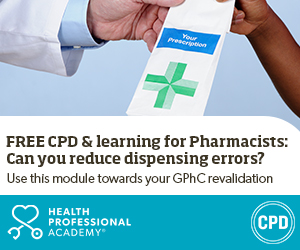The General Pharmaceutical Council will hold three pre-registration assessments in this year with the first sitting being for the provisionally registered pharmacists that should have sat the delayed summer 2020 exam.
The pharmacy regulator expects that as many as 3,200 candidates are likely to sit the new online assessment next month. It also estimates 60 per cent pass rate due to the new nature of the exam and current climate, according to GPhC’s council papers published ahead of its meeting on Thursday (Feb 11).
“As the provisional register is open until July, and we are aware that not all candidates will have opted to sit the March exam,” it said.
The GPhC is also expects that the second assessment in the summer is likely to host 4,500 candidates. “These will be made up of 40 percent of candidates that have either chosen not to sit or are re-sitting the March exam and the main cohort of candidates currently undergoing the pre-reg training (c.2,815),” it added.
Based on historical trends, the GPhC expects that 90 percent of the passed candidates are likely to fully register, which is projected to be a year on year pharmacists’ growth of seven percent on 2020-21.
The closing number of pharmacy premises on the register at the end of financial year 2020-21 is forecast to decrease by 1.6 percent on last year, the regulator said.
During 2021-22, the GPhC projects that the number of pharmacists will move up by seven per cent with significantly high level of growth. The higher growth follows a very low level of growth in 2020 with a minimal number of new registrants joining the register offset by a lower than usual number of pharmacists leaving the register.
“It is very unlikely that this level of growth will remain, and we would conservatively estimate that levels of growth return to levels expected last year,” GPhC said.
Those levels already included given factors such as the shrinking population of university age, lowering of entry standards in certain areas and a smaller proportion of students completing their studies. The insights report should also start to indicate potential impacts of the post pandemic behaviours.







